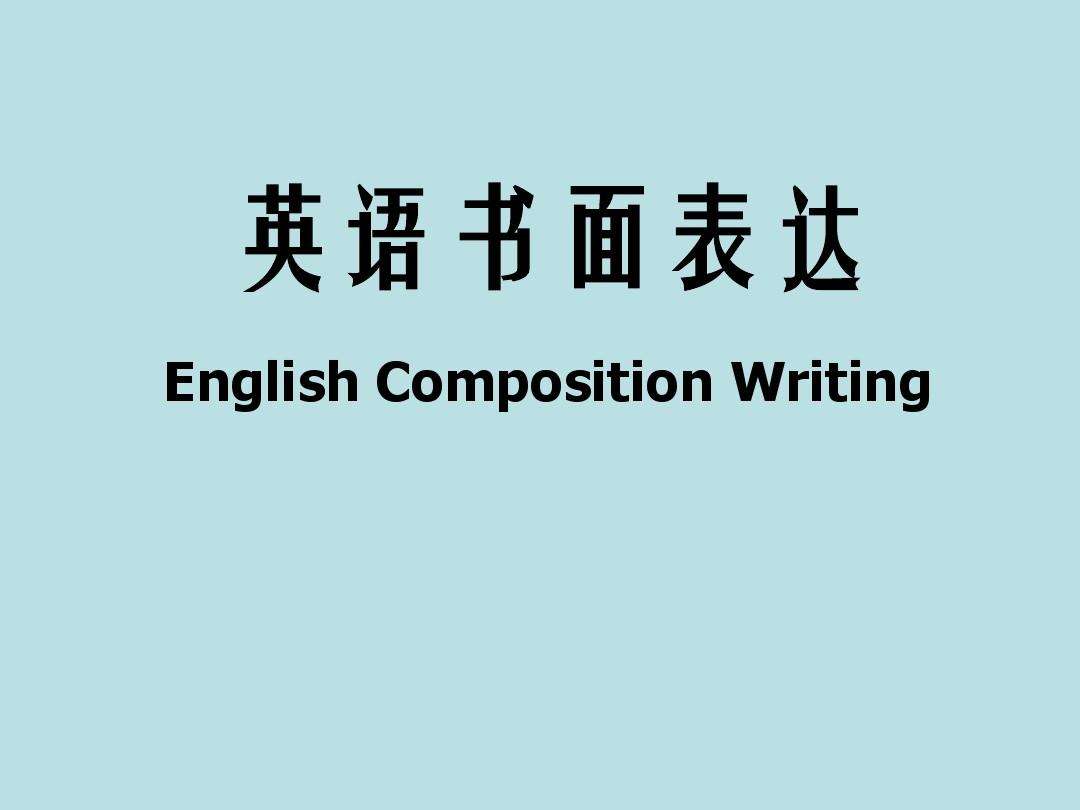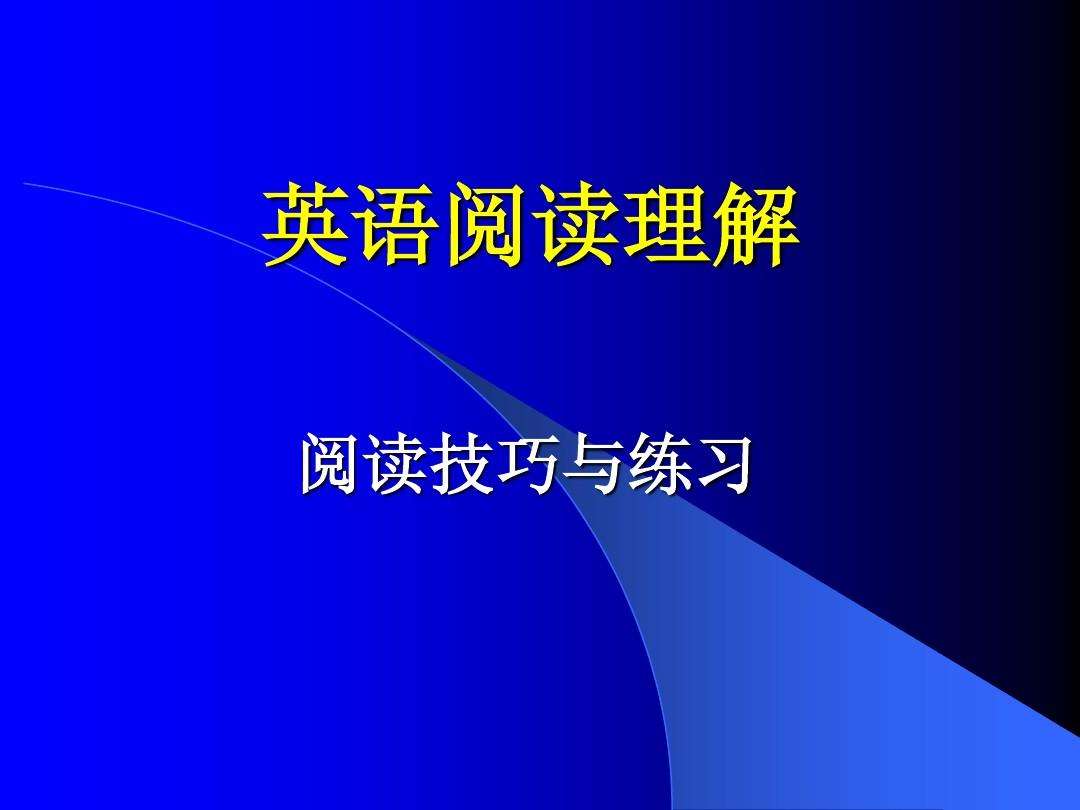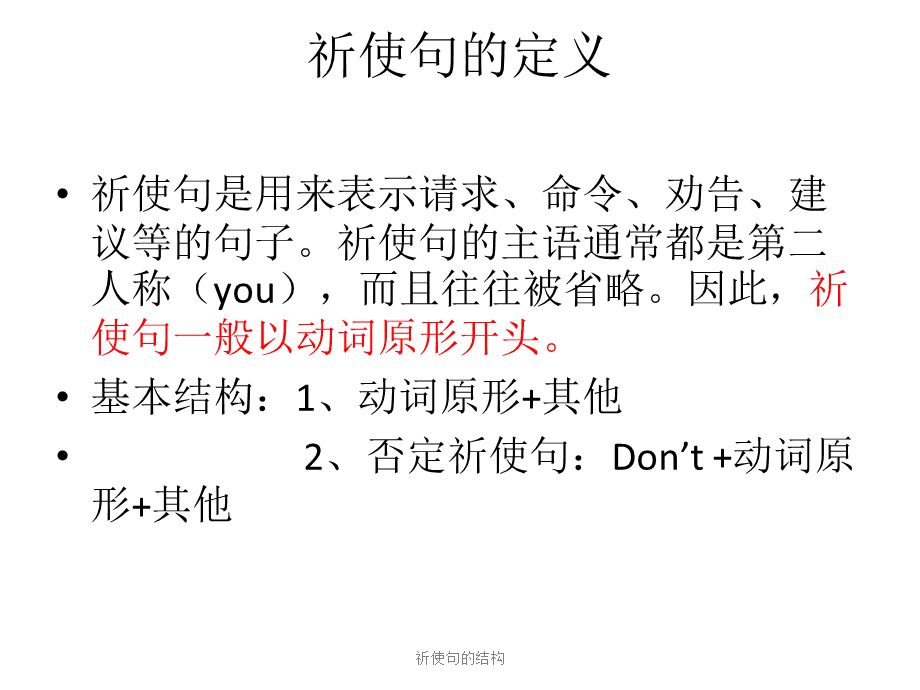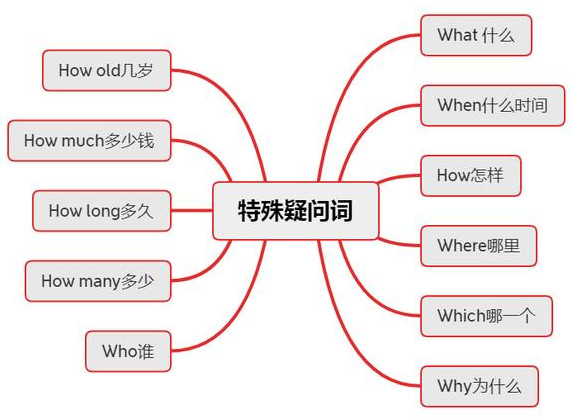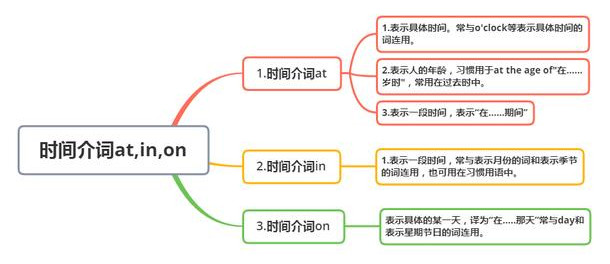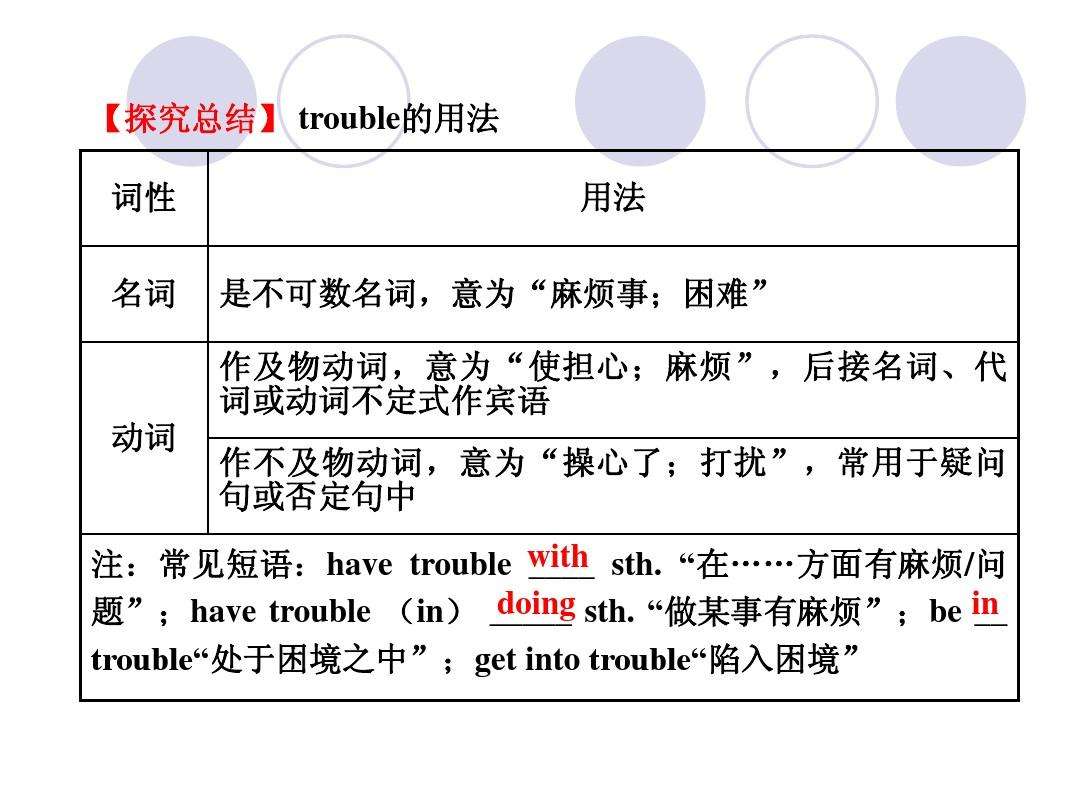| 宜城教育365速发国际靠谱么_365bet亚洲官方网址_预付365商城下载网www.bjtlcd.com 形容词比较级的用法和句型
1.“the +比较级+ (主语+谓语),the +比较级 +(主语+谓语)”是一个固定的句型,意思是“越……,就越……。” 在这个句型中,前一个分句表示条件,后一个分句表示结果,因此在表达将来的意义时,前一个分句只用一般现在时。
2.表示"比…更",用比较级形容词+than+比较成分,than后主词的述语动词往往省略,非正式用法的`than后的人称代名词可用受格。
3.表示"较…低; 不及…"用less+原级形容词+than+比较成分。
4.表示两者之中"较…",用the+比较级+of the two。
5.定冠词或指示形容词+比较级+名词表示比较。
6.有少数以ior结尾的形容词,如inferior(次于),junior(年幼的;下级的),posterior(之后),prior(之前),senior(年长的,上级的),superior(优于)等本身就有比较的意思,常与介系词to连用。
7.比较形容词可以被副词如a little(一点),much(得多),even(更加),still(更加),far(…的多)等修饰,但不可用very修饰。
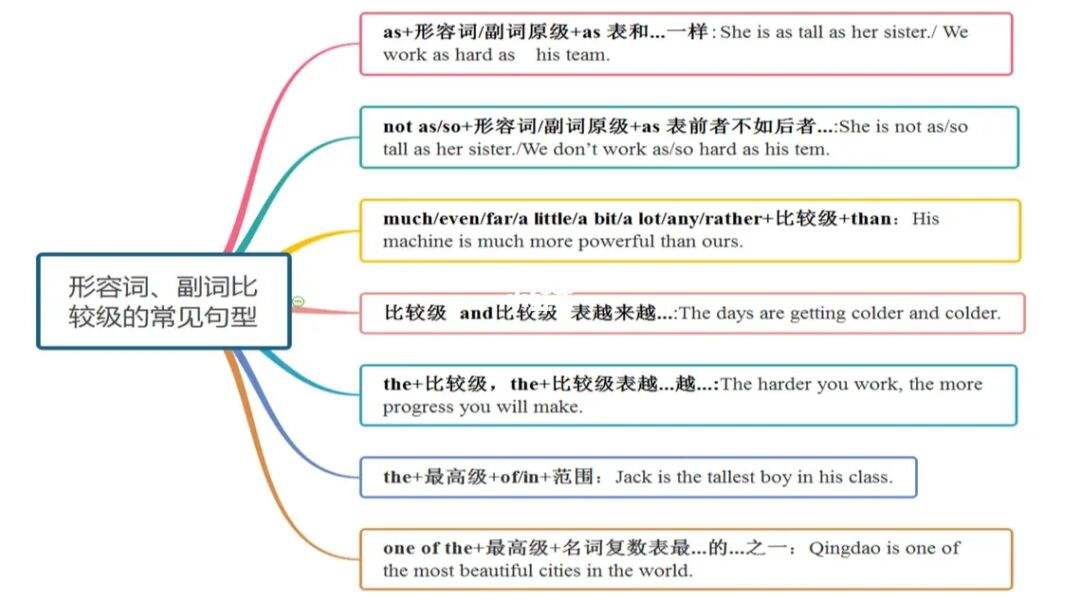
比较级基本句型:
同级比较:
1、由“…as+形容词原型+as…”或“…as+形容词+名词+as…”构成。
2、由“…not so (as)+形容词或副词原型+as…”或“…not so (as)+形容词+名词+as…”构成。
降级比较:
1、由“…形容词比较级+than…”构成。
2、由“…many/much more+可数/不可数名词+than…”
英语比较级和最高级的用法归纳
英语比较级和最高级的用法
一、形容词、副词的比较级和最高级的构成规则
1.一般单音节词和少数以-er,-ow结尾的双音节词,比较级在后面加-er,最高级在后面加-est;
(1)单音节词
如:small→smaller→smallest short→shorter→shortest
tall→taller→tallest great→greater→greatest
(2)双音节词
如:clever→cleverer→cleverest narrow→narrower→narrowest
2.以不发音e结尾的单音节词,比较在原级后加-r,最高级在原级后加-st;
如:large→larger→largest nice→nicer→nicest able→abler→ablest
3.在重读闭音节(即:辅音+元音+辅音)中,先双写末尾的辅音字母,比较级加-er,最高级加-est;
如:big→bigger→biggest hot→hotter→hottest fat→fatter→fattest
4.以“辅音字母+y”结尾的双音节词, 把y改为i,比较级加-er,最高级加-est;
如:easy→easier→easiest heavy→heavier→heaviest
busy→busier→busiest happy→happier→happiest
5.其他双音节词和多音节词,比较级在前面加more,最高级在前面加most;
如:beautiful→more beautiful→most beautiful
different→more different→most different
easily→more easily→most easily
注意:(1)形容词最高级前通常必须用定冠词 the,副词最高级前可不用。
例句: The Sahara is the biggest desert in the world.
(2) 形容词most前面没有the,不表示最高级的含义,只表示"非常"。
It is a most important problem.
=It is a very important problem.
6.有少数形容词、副词的比较级和最高级是不规则的,必须熟记。
如:good→better→best well→better→best
bad→worse→worst ill→worse→worst
old→older/elder→oldest/eldest
many/much→more→most little→less→least
far →further/farther→ furthest/farthest
二、形容词、副词的比较级和最高级的用法
1.“A + be +形容词比较级 + than + B” 意思为“A比B更……”。
如:This tree is taller than that one. 这棵树比那棵树高。
注意:
① 在含有连词than的比较级中,前后的比较对象必须是同一范畴,即同类事物之间的比较。
②在比较级前面使用much,表示程度程度“强得多”。
如:A watermelon is much bigger than an apple.
③ very, quite一般只能修饰原级,不能修饰比较级。
2.“比较级 + and + 比较级”或“more and more +原级”表示“越来越……”
如:It becomes warmer and warmer when spring comes.
春天来了,天气变得越来越暖和了。
It is getting cooler and cooler.
天气越来越凉爽。
The wind became more and more heavily.
风变得越来越大。
Our school is becoming more and more beautiful.
我们的学校变得越来越美丽。
3.在含有or的选择疑问句中,如果有两者供选择,前面的形容词要用比较级形式。
如:Who is taller,Tim or Tom? 谁更高,Tim还是Tom?
4. “the +比较级……, the+比较级”,表示“越……越……”。
The more money you make, the more you spend.
钱你赚得越多,花得越多。
The sooner,the better.
越快越好。
5. 表示倍数的比较级用法:
①. A is …times the size /height/length/width of B.
如:The new building is three times the height of the old one.
这座新楼比那座旧楼高三倍。(新楼是旧楼的四倍高)
②. A is …times as big /high/long/wide/large as B.
如:Asia is four times as large as Europe.
亚洲是欧洲的四倍大。(亚洲比欧洲大三倍)
③. A is …times larger /higher/longer/wider than B.
如:Our school is twice bigger than yours.
我们学校比你们学校大两倍。
6.形容词、副词的最高级形式主要用来表示三者或三者以上人或事物的比较,表示“最……”的意思。
句子中有表示范围的词或短语。如:of the three, in our class等等。
如:He is the tallest in our class.
他在我们班里是最高的。
7."否定词语+比较级","否定词语+ so… as"结构表示最高级含义。
Nothing is so easy as this.
=Nothing is easier than this.
=This is the easiest thing.
8. 比较级与最高级的转换:
Mike is the most intelligent in his class.
Mike is more intelligent than any other student in his class
7.修饰比较级和最高级的词
1)可修饰比较级的词
①.a bit, a little, rather, much, far, by far, many, a lot, lots, a great deal, any, still, even等。
②. 还可以用表示倍数的词或度量名词作修饰语。
③. 以上词(除by far)外,必须置于比较级形容词或副词的前面。
注意: 使用最高级要注意将主语包括在比较范围内。
(错) Tom is the tallest of his three brothers.
(对) Tom is the tallest of the three brothers.
2)下列词可修饰最高级:by far, far, much, mostly, almost。
This hat is nearly / almost the biggest.
注意:
a. very可修饰最高级,但位置与much不同。
This is the very best.
This is much the best.
b. 序数词通常只修饰最高级。
Africa is the second largest continent.
8.要避免重复使用比较级。
(错) He is more cleverer than his brother.
(对) He is more clever than his brother.
(对) He is cleverer than his brother.
9.要避免将主语含在比较对象中。
(错) China is larger that any country in Asia.
(对) China is larger than any other country in Asia.
10.要注意对应句型,遵循前后一致的原则。
The population of Shanghai is larger than that of Beijing.
It is easier to make a plan than to carry it out.
11.要注意冠词的使用,后有名词的时候,前面才有可能有名词。
比较:Which is larger, Canada or Australia?
Which is the larger country, Canada or Australia?
She is taller than her two sisters.
She is the taller of the two sisters。
“the+比较级”的四种用法
用法一:the+比较级+名词
其中的定冠词表特指,比较级为形容词,用以修饰其后的名词。如:
“Which of them is the better choice?”“Well, it’s hard to tell.”“他们谁是更合适的人选?”“嗯,这很难说。”
Some of the more time-consuming jobs can now be done by machines. 有些更费时间的工作现在可以用机器做了。
【注意】当意思明确时,比较级后的名词有时可以省略。如:
Which of the two methods is the better?这两种方法哪一种更好?
Of the two possibilities, this is more likely than that. 两个可能性中,后者比前者更可能。
There are two books on this subject, but I am not sure which is the better (one). 关于这个科目的书有两本,但我不肯定哪一本更好。
Mary was the more beautiful of the two. 玛丽是这两个人当中较美丽的。
用法二:the+比较级
这类结构通常连用表示原因、理由或条件的短语或从句,其中的比较级为副词,主要用来修饰动词。如:
He’s had a holiday and looks the better for it. 他度假之后,气色好多了。
I love him all the more for his faults. 正因为他这些缺点,所以我越发爱他。
You’ll feel all the better for a good night’s sleep. 你好好睡上一晚,心情就好多了。
用法三:the+比较级,the+比较级
表示两者同时递增或递减,其意为“越……越……”;根据句意的需要,其中的比较级既可以是形容词,也可以是副词。如:
The younger you are, the easier it is to learn. 年纪越轻,学习越容易。
The more money you make, the more you spend. 你挣的钱越多,花的钱也越多。
The more she thought about it,the more depressed she became. 她越想越别扭。
I want you out of here, and the sooner the better. 你给我走开,越快越好。
The less said about the whole affair,the happier I’ll be. 对整件事谈得越少我越高兴。
用法四:by far the+比较级
当比较级前面有 by far 修饰时,比较级习惯上要带 the。如:
He is by far the cleverer than her. 他比她聪明得多。
This dictionary is by far the better than that one. 这本词典比那本要好得多。
【注意】这样用时,by far 总是放在比较级的前面,若将 by far 置于比较级之后,则可以不用 the。如:
He is cleverer by far than her. 他比她聪明得多。 宜城教育365速发国际靠谱么_365bet亚洲官方网址_预付365商城下载网www.bjtlcd.com |






